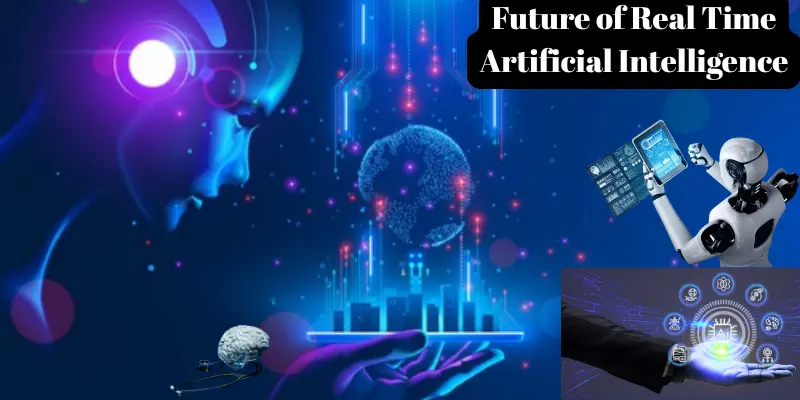Real Time Artificial Intelligence – How It Works & Benefits
Published: 31/03/2025
Real Time Artificial Intelligence (AI) is a smart technology that makes instant decisions using live data. Unlike traditional AI, which processes stored data, Real-Time AI works with current and live data to give quick and accurate results.
Many industries use AI with real-time data, such as healthcare, finance, customer service, and gaming. For example, hospitals use real-time AI to monitor patients, while banks use it to detect fraud. AI with access to real-time data helps businesses work faster and better.
With the rise of real-time learning AI, machines can now learn and improve instantly. This makes real-time AI chatbots, smart assistants, and automated tools more efficient. Companies like Google and top AI platforms are using real-time AI to provide better services.
Table of Contents
How Real Time Artificial Intelligence Works
Real-Time Artificial Intelligence (AI) works by using live data to make quick decisions. Unlike traditional AI, which depends on stored information, AI with real-time data processes new information instantly. This makes AI faster and more accurate.

There are three main steps in how real-time AI works:
- Collecting Real-Time Data
- AI real-time systems take live information from different sources like sensors, cameras, or the internet. For example, real-time AI chatbots get messages from users and reply instantly.
- Processing and Understanding Data
- Real-time learning AI quickly analyzes the data and understands what needs to be done. AI with access to real-time data helps businesses make smart choices without delays.
- Taking Action
- After understanding the data, real-time AI gives instant results. For example, in self-driving cars, real-time artificial intelligence helps the car stop if there is an obstacle on the road.
Modern real-time tools and data-based AI help businesses, healthcare, and finance industries work more efficiently. Companies like Google are developing Google real-time AI to improve user experience.
Applications of Real-Time AI
Real-Time Artificial Intelligence (AI) is used in many industries to make fast and smart decisions. With AI real-time processing, businesses and people can get instant results. Here are some important areas where real-time AI is making a difference:
- Healthcare
- AI with real-time data helps doctors monitor patients and detect diseases early.
- Hospitals use real-time learning AI for faster diagnosis and treatment.
- Customer Service
- Real-time AI chatbots give instant replies to customers, improving support services.
- Companies use real-time tools to understand customer needs and solve problems quickly.
- Finance & Banking
- Banks use real-time artificial intelligence to detect fraud and protect accounts.
- AI with access to real-time data helps in predicting stock market trends.
- Transportation & Self-Driving Cars
- Real-time AI helps self-driving cars make quick decisions, like stopping at red lights.
- Navigation apps use live time data to suggest the fastest routes.
- Gaming & Entertainment
- Real-time generative AI creates smarter and more interactive video games.
- Live AI adjusts music and video recommendations based on user activity.
- Online Platforms & Search Engines
- Google real-time AI improves search results based on current trends.
- Data-based AI helps e-commerce websites suggest products based on customer interests.
- Lottery & Betting Industry
- Some companies use real-time lottery artificial intelligence to analyze winning patterns.
- Realtime AI helps in predicting results based on past data.
With real-time research and new technologies, real-time AI is becoming more advanced. From healthcare to online platforms, this technology is shaping the future of many industries.
Best Real Time Artificial Intelligence Platforms
Many companies are developing real-time AI platforms to help businesses and individuals make quick decisions using live data. Here are some of the best platforms that use AI with real-time data for different industries:

1. Google Real-Time AI
- Google real-time AI improves search results and helps businesses analyze trends.
- Google Assistant and other AI tools use real-time learning AI for better responses.
2. IBM Watson
- IBM Watson is a powerful data-based AI platform that helps companies process live time data for better decision-making.
- It is widely used in healthcare, finance, and customer service.
3. Microsoft Azure AI
- Azure AI provides real-time AI chatbots and smart automation for businesses.
- It allows companies to use AI with access to real-time data to improve customer interactions.
4. OpenAI (ChatGPT & DALL·E)
- OpenAI’s models like ChatGPT use real-time artificial intelligence to understand and generate human-like responses.
- Real-time generative AI like DALL·E creates images based on user input.
5. Amazon Web Services (AWS AI)
- AWS offers real-time tools that businesses use for data analysis, security, and automation.
- It helps in managing real-time online applications and cloud computing.
6. NVIDIA AI
- NVIDIA uses AI real-time processing for self-driving cars, gaming, and medical research.
- It powers realtime AI applications that require high-speed computing.
7. DataRobot
- DataRobot is a real-time AI platform that helps businesses make predictions using real-time research and machine learning.
- It is commonly used in finance and healthcare.
8. H2O.ai
- H2O.ai provides real-time learning AI tools that help companies improve automation and data analysis.
- It is known for its speed and accuracy in handling AI with current data.
These platforms are leading the way in real-time artificial intelligence, making technology smarter and more efficient. Businesses and developers use these data and AI platforms to improve customer service, healthcare, finance, and more.
Challenges in Real-Time AI
Real-time artificial intelligence (AI) is making technology smarter and faster. However, using AI with real-time data also comes with some challenges. Here are some of the main problems that companies face while working with real-time AI:
- High-Speed Data Processing
- AI with access to real-time data needs to process huge amounts of information instantly.
- If the system is slow, real-time learning AI may not give accurate results.
- Hardware Limitations
- Real-time AI requires powerful computers and advanced processors.
- Many businesses cannot afford high-performance data-based AI systems.
- Security and Privacy Risks
- Real-time artificial intelligence collects live data, which can be hacked or misused.
- Companies need strong security measures to protect real-time online information.
- Data Quality Issues
- If AI real-time systems receive incorrect or outdated data, they may make wrong decisions.
- Real-time research is needed to improve AI accuracy and reliability.
- High Costs of Development
- Building and maintaining real-time AI chatbots and realtime AI platforms can be expensive.
- Businesses must invest in real-time tools and skilled developers.
- Ethical Concerns
- AI with current data may be biased if it learns from incorrect or unfair information.
- Companies need to ensure that real-time AI makes fair and unbiased decisions.
Despite these challenges, companies like Google and Microsoft are working on real-time AI improvements. With better technology, real-time generative AI and live AI will become more efficient and secure in the future.
Future of Real Time Artificial Intelligence
The future of real-time artificial intelligence (AI) is very exciting. As technology improves, AI with real-time data will become smarter and faster. Many industries are working on new ways to use real-time AI for better results.

- Faster and More Accurate AI
- AI real-time processing will become even quicker, helping businesses make instant decisions.
- Real-time learning AI will improve its accuracy by learning from live time data.
- Better AI for Healthcare and Safety
- In hospitals, AI with access to real-time data will help doctors detect diseases earlier.
- Real-time AI will also improve security by detecting cyber threats instantly.
- Smarter AI in Daily Life
- Real-time AI chatbots will become more human-like, improving customer service.
- Google real-time AI and search engines will provide more accurate and fast information.
- Advanced AI for Businesses
- Companies will use real-time generative AI to create videos, images, and content instantly.
- Data-based AI will help businesses make better marketing and sales decisions.
- Improved AI in Self-Driving Cars
- Realtime AI will make self-driving cars safer by detecting obstacles faster.
- AI with current data will improve navigation and traffic management.
- Growth of AI Platforms
- Which AI platform is best in accuracy? This question will become more important as companies compete to create the best real-time tools.
- Kera real-time generative AI and other new technologies will change the AI industry.
With real-time research and better AI systems, the future of real-time artificial intelligence looks bright. This technology will continue to grow, making life easier and businesses more efficient.
Advantages and Disadvantages of Real-Time AI
Real-time artificial intelligence (AI) is making technology faster and smarter. It has many benefits, but there are also some challenges.
Benefits of Real-Time AI
| Pros |
|---|
|
Drawbacks of Real-Time AI
| Cons |
|---|
|
Common FAQs About Real-Time AI
Here are some common questions and answers about real-time artificial intelligence (AI):
Real-time AI is a type of artificial intelligence that makes instant decisions using live data. It does not rely on old stored data but processes new information quickly.
Traditional AI uses past data to make predictions, while AI with real-time data works with current and live information. This makes real-time AI faster and more accurate.
Real-time AI is used in many areas, including:
- Healthcare (patient monitoring, disease detection)
- Finance (fraud detection, stock market analysis)
- Self-driving cars (traffic control, obstacle detection)
- Customer service (real-time AI chatbots, smart assistants)
- Gaming & entertainment (real-time generative AI, smart NPCs)
Some key benefits of real-time artificial intelligence include:
- Faster decision-making
- More accurate predictions
- Better customer service
- Safer self-driving cars
- Improved healthcare
Real-time AI also has some challenges, such as:
- High costs of development
- Security and privacy risks
- The need for high-speed processing
- Possible job losses due to automation
Many platforms offer AI with access to real-time data, including:
- Google real-time AI (for search and automation)
- IBM Watson (for business and healthcare)
- Microsoft Azure AI (for customer support and automation)
- OpenAI (for chatbots and real-time generative AI)
Yes, some platforms provide free AI with real-time data, but advanced features often require payment.
The future of real-time AI is bright. It will improve self-driving cars, customer service, healthcare, and business automation. Live AI will become more accurate, faster, and widely available.
Conclusion
Real-time artificial intelligence (AI) is changing the way we use technology. With AI real-time processing, businesses, healthcare, and daily life are becoming smarter and faster. From real-time AI chatbots to self-driving cars, this technology is improving many industries.
Although real-time AI has some challenges, like high costs and security risks, its benefits are much greater. With AI with real-time data, we can make quick decisions, improve accuracy, and provide better customer service. Companies like Google, Microsoft, and IBM are working to make real-time learning AI even better.
As technology grows, real-time AI will become more advanced and more accessible. Whether in healthcare, finance, or entertainment, real-time artificial intelligence will continue to shape the future.

- Be Respectful
- Stay Relevant
- Stay Positive
- True Feedback
- Encourage Discussion
- Avoid Spamming
- No Fake News
- Don't Copy-Paste
- No Personal Attacks

- Be Respectful
- Stay Relevant
- Stay Positive
- True Feedback
- Encourage Discussion
- Avoid Spamming
- No Fake News
- Don't Copy-Paste
- No Personal Attacks





